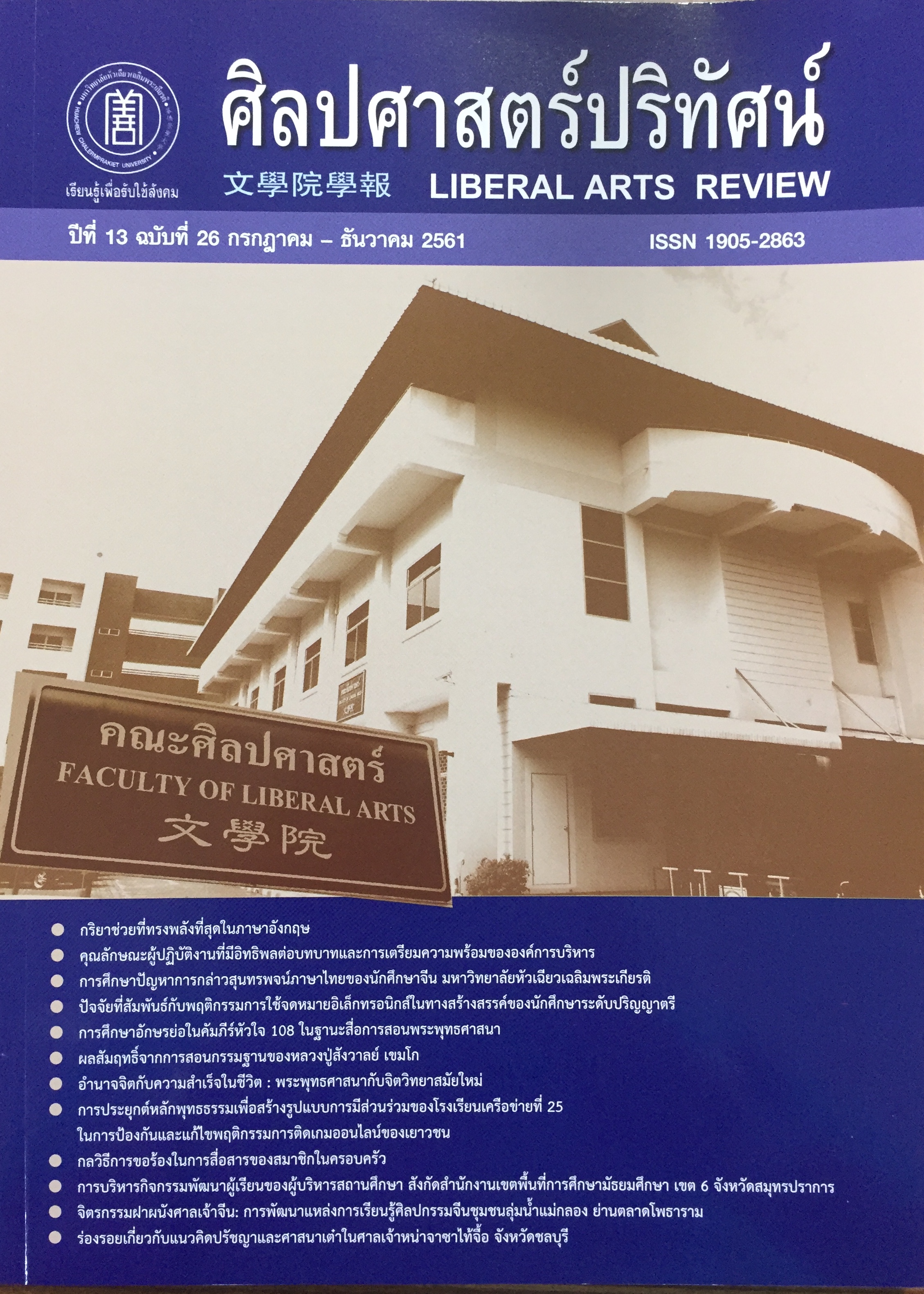The Application of Buddhadhamma Principle for Creating the Participation Model of the 25th Network School in Protecting and Correcting the Online Game Addiction Behavior of the Youth
Abstract
This research aimed to study the problems of online game addiction behavior
of the 25th network school; to study the principles of Buddhadhamma to be applied
as the solution to problems of online game addiction behavior of Thai youths; and to
propose the participation model of the 25th network school in preverting and solving
the problem of online game addiction of the Thai youths in accordance with the
Buddhadhamma principles. This research is fulfilled by use of questionnaire and
interviewing.
The research found that the problems of online game addiction behavior of the 25th
school network are caused by the following 2 factors: (1) internal factors; they include
the personalities of children and the youths; and (2) external factors; they refer to family,
friends, and environments. The principles of Buddhadhamma concerning the solutions
of the problem of online game addiction behavior of Thai youths are the principles of
Yonisomanasikāra, Six Directions, Brahmavihãra (4 holy abiding or sublime states of
mind) and Sangahavatthu (4 bases of social solidarity). The participation models of the
25th network school in preverting and solving the problems of online game addiction
behaviour of the Thai youths in accordance with the Buddhadhamma principles are of:
(1) making children and the youths ashamed of doing improper things and also making
them morally fearful of doing improper things, which will consequently bring to them
good things, happiness, confidence, and pride; (2) making people surrounding children
and the youths thoughtful of loving-kindness, compassion, and sacrifice; (3) teaching
children and the youths including people around them to have helpful behaviors, which
will lead them to happiness and prosperity; and (4) inculcating the senses of amiability
and respectfulness to children and the youths including their families.
In this research, the results of application of Buddhadhamma affecting behaviours of
children and the youths clearly showed they were able to think in the right ways and
to perform their duties well due to having the sense of pride a nd confidence in
themselves, and making them adorable, admirable, and sociable to others. The results
of application of Buddhadhamma affecting behaviours of their fa milies also clearly
showed that parents love and care for their children, performing as role models for
their kids, observing sets of discipline and good practice giving rise to amiability and
encouragement to one another. Additionally, the results of application of Buddhadhamma
affecting behaviours of children and the youths at schools found that they are punctual
in coming to school and delivering their assignments are obedient, and dutiful. Also
they are encouraging their friends to behave the right ways and to stay in a good
environment.
References
กระบวนการปลูกฝังคุณธรรมจริยธรรมของประเทศต่าง ๆ. พิมพ์ครั้งที่ 2. กรุงเทพมหานคร :
ศูนย์ส่งเสริมและพัฒนาพลังแผ่นดินเชิงคุณธรรม สำนักงานบริหารและพัฒนาองค์ความรู้
(องค์การมหาชน).
ธาริน เสวกจันทร์. (2552) พฤติกรรมและผลกระทบจากการเปิดรับสื่อเกมออนไลน์ของนักเรียน
มัธยมศึกษาในเขตอำเภอเมือง จังหวัดสุราษฎร์ธานี. วิทยานิพนธ์ ค.ม. (สาขาครุศาสตร์เทคโนโลยี)
กรุงเทพมหานคร : บัณฑิตวิทยาลัย มหาวิทยาลัยเทคโนโลยีพระจอมเกล้าธนบุรี.
นภัทร จันทร์เจริญ เป็นผู้ให้สัมภาษณ์. สุภาพร ธวัชราภรณ์ เป็นผู้สัมภาษณ์. ที่โรงเรียนแย้มจาดวิชชานุสรณ์.
เมื่อวันที่ 13 กันยายน 2559.
ปิยวิทย์ ประชาศิลย์ เป็นผู้ให้สัมภาษณ์. สุภาพร ธวัชราภรณ์ เป็นผู้สัมภาษณ์. ที่โรงเรียนวัดบางเตย. เมื่อ
วันที่ 7 กันยายน 2559.
พระธรรมปิฎก (ประยุทธ์ ปยุตฺโต). (2538) ความคิด : แหล่งสำคัญของการศึกษา. กรุงเทพมหานคร :
มหาจุฬาลงกรณราชวิทยาลัย.
พระธรรมปิฎก (ประยุทธ์ ปยุตฺโต).(2546) พุทธธรรม. กรุงเทพมหานคร : มหาจุฬาลงกรณราชวิทยาลัย.
พระธรรมปิฎก (ประยุทธ์ ปยุตฺโต). (2547) วิธีคิดตามหลักพุทธธรรม. กรุงเทพมหานคร : ศยาม.
พระพรหมคุณาภรณ์ (ป. อ. ปยุตฺโต). (2556) พจนานุกรมพุทธศาสน์ ฉบับประมวลธรรม. พิมพ์ครั้งที่ 24.
กรุงเทพมหานคร : โรงพิมพ์พระพุทธศาสนาของธรรมสภา.
พระมหาอดิเดช สติวโร (สุขวัฒนวดี) เป็นผู้ให้สัมภาษณ์. สุภาพร ธวัชราภรณ์ เป็นผู้สัมภาษณ์. ที่
มหาจุฬาลงกรณวิทยาลัย เมื่อวันที่ 3 เมษายน 2559.
มหาจุฬาลงกรณราชวิทยาลัย. (2539) พระไตรปิฎกภาษาไทย. กรุงเทพมหานคร : โรงพิมพ์มหาจุฬาลงกรณ-
ราชวิทยาลัย.
มี้ทติ้งมอล. (2548) โรคติดอินเทอร์เน็ต : มันจะทำให้เกิดโรคใหม่ชนิดหนึ่ง. กรุงเทพมหานคร : ม.ป.ท.
รุจา ภู่ไพบูลย์ และคณะ. (2542) ผลกระทบของภาวะวิกฤตเศรษฐกิจต่อเด็ก เยาวชน และครอบครัวและ
ความต้องการความช่วยเหลือ. กรุงเทพมหานคร : สำนักงานกองทุนสนับสนุนการวิจัย.
วรเศรษฐ์ รื่นชดกุลนิษฐ์. (2555) ปัญหาเด็กติดเกมส์. วิทยานิพนธ์ ศศ.ม. (สาขาพัฒนาสังคม). พิษณุโลก
: บัณฑิตวิทยาลัย มหาวิทยาลัยนเรศวร.
สถาบันวิจัยประชากรและสังคม. (2548) สุขภาพคนไทย 2548. นครปฐม : มหาวิทยาลัยมหิดล.
สำนักงานคณะกรรมการพัฒนาการเศรษฐกิจและสังคมแห่งชาติ. (2549) แผนพัฒนาการเศรษฐกิจและ
สังคมแห่งชาติฉบับที่ 10 พ.ศ. 2550-2554. กรุงเทพมหานคร : สำนักงาน.
สำนักงานสถิติแห่งชาติ. (2554) สำรวจการมีและการใช้เทคโนโลยีสารสนเทศในครัวเรือน ระหว่าง พ.ศ.
2550-2554. [ออนไลน์] แหล่งที่มา : http://service.nso.go.th/nso/nsopublish/citizen/news/
news_internet_teen.jsp
สุชาดา สิตวงษ์ เป็นผู้ให้สัมภาษณ์. สุภาพร ธวัชราภรณ์ เป็นผู้สัมภาษณ์. ที่โรงเรียนแย้มจาดวิชชานุสรณ์.
เมื่อวันที่ 15 กันยายน 2559.
สุพจน์ หว่านเงิน เป็นผู้ให้สัมภาษณ์. สุภาพร ธวัชราภรณ์ เป็นผู้สัมภาษณ์. ที่โรงเรียนแย้มจาดวิชชานุสรณ์.
เมื่อวันที่ 6 กันยายน 2559.
Downloads
Published
How to Cite
Issue
Section
License
บทความที่ได้รับการตีพิมพ์เป็นลิขสิทธิ์ของวารสารศิลปศาสตร์วิชาการและวิจัย
ข้อความที่ปรากฏในบทความแต่ละเรื่องในวารสารวิชาการเล่มนี้เป็นความคิดเห็นส่วนตัวของผู้เขียนแต่ละท่านไม่เกี่ยวข้องกับมหาวิทยาลัยหัวเฉียวเฉลิมพระเกียรติ และคณาจารย์ท่านอื่นๆ ในมหาวิทยาลัยฯ แต่อย่างใด ความรับผิดชอบองค์ประกอบทั้งหมดของบทความแต่ละเรื่องเป็นของผู้เขียนแต่ละท่าน หากมีความผิดพลาดใดๆ ผู้เขียนแต่ละท่านจะรับผิดชอบบทความของตนเองแต่ผู้เดียว




